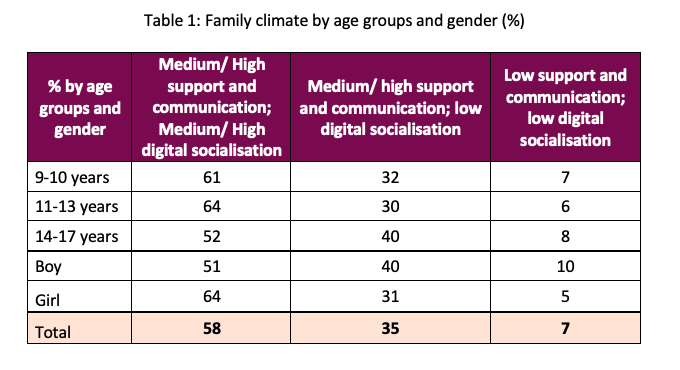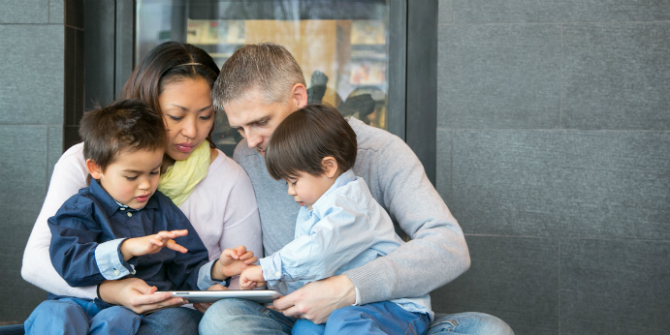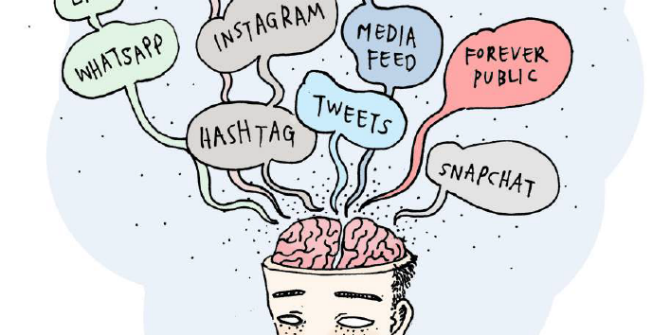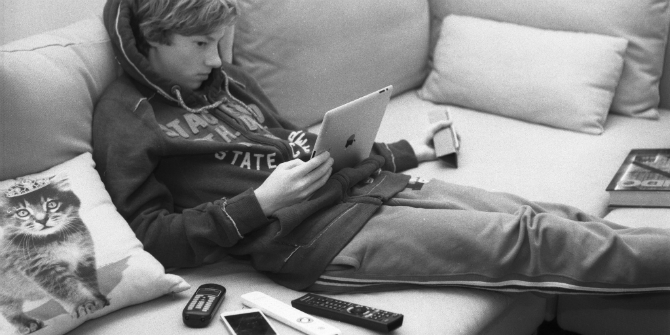 Drawing on recent data from the EU Kids Online survey, Cristina Ponte and Susana Batista look at the ‘family climate’ [1] reported by Portuguese children aged 9-17 and how it varies by age and gender. Compared to the results of the first EU Kids Online pan-European survey (2010), they note that in both surveys the pattern of a confident, caring and communicative family is dominant. However, the gap between almost unanimous self-perceptions of family safety support, and lower rates of forms of digital support and enabling mediation, call for more research into how children’s age and gender may be associated with digital socialisation. [Header image credit: C.-JL-.jpg]
Drawing on recent data from the EU Kids Online survey, Cristina Ponte and Susana Batista look at the ‘family climate’ [1] reported by Portuguese children aged 9-17 and how it varies by age and gender. Compared to the results of the first EU Kids Online pan-European survey (2010), they note that in both surveys the pattern of a confident, caring and communicative family is dominant. However, the gap between almost unanimous self-perceptions of family safety support, and lower rates of forms of digital support and enabling mediation, call for more research into how children’s age and gender may be associated with digital socialisation. [Header image credit: C.-JL-.jpg]
Introduction
A cluster analysis on parent-child interrelations in terms of parental mediation, digital competence, and communicative proximity, based on the first pan-European survey EU Kids Online (2010), identified four types of parent-child relationship with respect to internet. Each type was shaped by factors related to child, family, and country, with the child’s age and internet use as the most important predictors. The ‘confident, caring and communicative’ family was the most frequent type of parent-child relationship among European families. Based on answers from both children and parents, this ‘triple C’ family was characterised by high levels of active mediation, proximity indicators mostly above the average and children most likely to report harmful experiences. This was also the leading family type in Portugal.
Almost a decade later, the new EU Kids Online survey conducted in Portugal allows us to look again at the family climate reported by Portuguese children aged 9-17 (N=1861) in order to find out if the trend is still the same.
The family climate among Portuguese families
We first considered questions on support and communication at home:
- How true are the following things about your family and home? My family really tries to help me; I feel safe at home; When I speak someone listens to what I say;
- How often do the following things apply to you? My parent or carer praises me for behaving well; My parent or carer sets rules about what I can do at home.
Then we looked at questions of digital socialisation, such as the active role of the child as the helper of older generations, and practices of enabling mediation as pointed by Sonia Livingstone and colleagues regarding parents’ social mediation and mediation for safety uses. We also looked at communication regarding opportunities and coping with being bothered:
- I was helped by a parent to do something I found difficult on the internet
- My parent or carer suggests ways to use the internet safely
- My parent or carer talks to me about what I do on the internet
- My parent or carer encourages me to explore and learn things on the internet
- My parent or carer helps me when something bothers me on the internet
- I told my parent or carer about things that bother or upset me on the internet
- I asked for my parent’s or carer’s help with a situation on the internet that I could not handle
As Figure 1 (below) shows, most children report broad agreement with a safe and supportive familiar context. These two items are slightly above rates concerning children’s perceptions of being heard at home, receiving compliments or experiencing a regulated household.
Figure 2 (below) shows lower rates of digital socialisation, either related to digital socialisation activated by parents or related to children’s behaviour and attitude as helpers or requesting support.
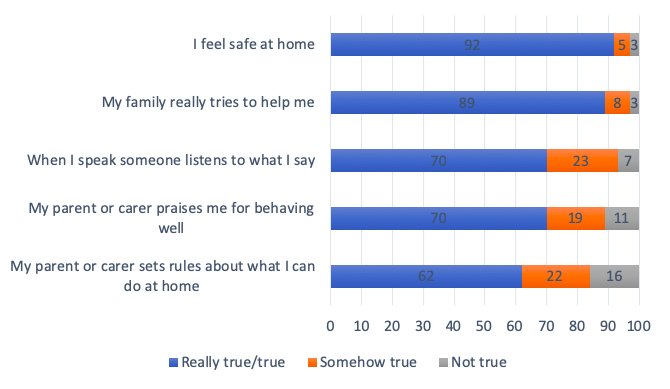

Looking at digital socialisation, there are two trends:
- More than half of the children are frequent digital helpers of their parents or carers, and report they never have ignored the rules about what they can do on the internet; this is in line with the high family support and regulation suggested by Figure 1;
- However, there are signs of disconnection, particularly in relation to digital opportunities and coping:
– Almost half of all children reported their parents had never encouraged them to explore and learn things on the internet; around half had never asked for help with an online situation they were not able to manage;
– More than two out of five children reported their parents neither talked to them about the uses of internet nor helped them in a difficult situation;
– About a third of the children reported their parents had never suggested ways to use the internet safely.
Three types of family climate
Combining the occurrence (often, sometimes) versus absence of occurrence (never) on overall family support and communication and digital socialisation, we developed three categories (see Table 1):
- Middle/high support and communication; middle/high digital socialisation. This is the dominant pattern (58%), in line with the ‘triple C’ (caring, communicative and confident families) found in 2010. It is particularly high among the younger (9-10 and 11-13) and slightly more reported by girls than by boys.
- Middle/high support and communication; low digital socialisation. More than one out of three (35%) children are in this type. The rates are slightly higher among adolescents and they are more reported by boys than girls.
- Low support and communication; low digital socialisation. This combination is reported by 7% of children. Interestingly, rates do not change with age, but they are again more reported by boys.
Some remarks
- Almost all Portuguese children aged 9-17 years old report a safe and supportive family atmosphere while practices of digital socialisation are far less reported.
- The current rates of high/medium digital socialisation confirm the caring, communicative and confidant family as the dominant pattern.
- Age differences matter. For instance, medium and low rates on enabling mediation reported by adolescents should not be disconnected from developmental tasks, such as the management of identity development, sexuality, intimacy, friendships and relationships, health issues and wellbeing.
- The fact that boys tend to report the lack of digital mediation more than girls may be related to the social construction of masculinity as having greater self-control. It may also be related to higher parental control over girls.
- The relatively high lack of parental intervention regarding online opportunities seems to be in line with Portuguese society having a culture of risk-avoidance.
Pointing to the future
- For a better understanding of the realities of the family climates, parents’ perspectives and reported behaviours should also be considered. Thus, this kind of data should be complemented by interviews inside families, considering different generational interactions (parents, children, other relatives).
- Provision of safety, support and communicative practices within the family should also include enabling mediation regarding the digital, particularly among younger children. Attention should be given to all children, thus avoiding gender stereotypes.
Notes
This post gives the views of the authors and does not represent the position of the LSE Parenting for a Digital Future blog, nor of the London School of Economics and Political Science.
[1] The ways family members interact with each other, family paradigms, coordinated practices, myths and rituals, see Eleanor Maccoby.


